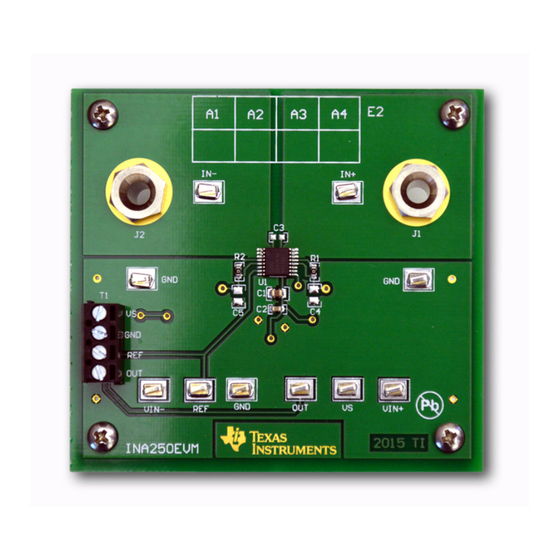
Table of Contents
Advertisement
Quick Links
This user's guide describes the characteristics, operation, and use of the INA250EVM evaluation module.
It discusses how to set up and configure the hardware and reviews various aspects of the hardware
operation. Throughout this document, the terms evaluation board, evaluation module, and EVM are
synonymous with the INA250EVM. This document also includes an electrical schematic, printed circuit
board (PCB) layout drawings, and a parts list for the EVM.
All trademarks are the property of their respective owners.
SBOU153 – May 2015
Submit Documentation Feedback
Copyright © 2015, Texas Instruments Incorporated
INA250EVM User's Guide
INA250EVM User's Guide
User's Guide
SBOU153 – May 2015
1
Advertisement
Table of Contents

Summary of Contents for Texas Instruments INA250EVM
- Page 1 SBOU153 – May 2015 INA250EVM User's Guide This user’s guide describes the characteristics, operation, and use of the INA250EVM evaluation module. It discusses how to set up and configure the hardware and reviews various aspects of the hardware operation. Throughout this document, the terms evaluation board, evaluation module, and EVM are synonymous with the INA250EVM.
-
Page 2: Table Of Contents
PCB Component Placement ....................... PCB Top Layer ......................PCB Bottom Layer List of Tables ....................INA250EVM Kit Contents ..................... Related Documentation ....................INA250 Test Board BOM INA250EVM User's Guide SBOU153 – May 2015 Submit Documentation Feedback Copyright © 2015, Texas Instruments Incorporated... -
Page 3: Overview
The following document provides information regarding Texas Instruments' integrated circuits used in the assembly of the INA250EVM. This user's guide is available from the TI web site under literature number SBOU153. Any letter appended to the literature number corresponds to the document revision that is current at the time of the writing of this document. -
Page 4: Ina250Evm Hardware
INA250EVM Hardware The INA250EVM requires a 2.7-V to 36-V power supply connected between the VS and GND screw terminals or test points. The INA250 has an integrated shunt of value 2 mΩ between the SH+ and SH– pins. Connect a –0.1-V to +36-V supply in series with the IN+ and IN–... -
Page 5: Features
INA250EVM Hardware www.ti.com Features The INA250EVM provides basic functional evaluation of this device. The fixture layout is not intended for electromagnetic compatibility (EMC) testing. The INA250EVM PCB is designed to provide the following features: • Ease of access to device pins with test points •... -
Page 6: Schematic, Pcb Layout, And Bill Of Materials
108-0740-001 108-0740-001 VIN+ VIN+ VIN- VIN- VIN+ VIN+ VIN+ VIN- VIN- ED555/4DS VIN- INA250A2PW TPGnd3 TPGnd2 0.1µF 1µF Figure 2. INA250 Test Board Schematic INA250EVM User's Guide SBOU153 – May 2015 Submit Documentation Feedback Copyright © 2015, Texas Instruments Incorporated... -
Page 7: Pcb Layout
Enhance the current handling capability by using proper layout techniques that facilitate heat dissipation. Combine the large power planes at the IN+ and IN– pins of the INA250EVM, and use a 2-oz copper pour to improve the heat-dissipation capabilities, and thus increase the continuous-load current capacity. -
Page 8: Pcb Top Layer
Schematic, PCB Layout, and Bill of Materials www.ti.com Figure 4. PCB Top Layer Figure 5. PCB Bottom Layer INA250EVM User's Guide SBOU153 – May 2015 Submit Documentation Feedback Copyright © 2015, Texas Instruments Incorporated... -
Page 9: Bill Of Materials
Terminal Block, 6A, 3.5mm Pitch, 4-Pos, TH ED555/4DS On-Shore Technology High or Low-Side, Zero-Drift Series Current Shunt Monitor with INA250A2PW Texas Instruments Integrated 2mOhm Shunt Resistor, PW0016A SBOU153 – May 2015 INA250EVM User's Guide Submit Documentation Feedback Copyright © 2015, Texas Instruments Incorporated... - Page 10 STANDARD TERMS AND CONDITIONS FOR EVALUATION MODULES Delivery: TI delivers TI evaluation boards, kits, or modules, including any accompanying demonstration software, components, or documentation (collectively, an “EVM” or “EVMs”) to the User (“User”) in accordance with the terms and conditions set forth herein. Acceptance of the EVM is expressly subject to the following terms and conditions.
- Page 11 FCC Interference Statement for Class B EVM devices NOTE: This equipment has been tested and found to comply with the limits for a Class B digital device, pursuant to part 15 of the FCC Rules. These limits are designed to provide reasonable protection against harmful interference in a residential installation.
- Page 12 【無線電波を送信する製品の開発キットをお使いになる際の注意事項】 開発キットの中には技術基準適合証明を受けて いないものがあります。 技術適合証明を受けていないもののご使用に際しては、電波法遵守のため、以下のいずれかの 措置を取っていただく必要がありますのでご注意ください。 1. 電波法施行規則第6条第1項第1号に基づく平成18年3月28日総務省告示第173号で定められた電波暗室等の試験設備でご使用 いただく。 2. 実験局の免許を取得後ご使用いただく。 3. 技術基準適合証明を取得後ご使用いただく。 なお、本製品は、上記の「ご使用にあたっての注意」を譲渡先、移転先に通知しない限り、譲渡、移転できないものとします。 上記を遵守頂けない場合は、電波法の罰則が適用される可能性があることをご留意ください。 日本テキサス・イ ンスツルメンツ株式会社 東京都新宿区西新宿6丁目24番1号 西新宿三井ビル 3.3.3 Notice for EVMs for Power Line Communication: Please see http://www.tij.co.jp/lsds/ti_ja/general/eStore/notice_02.page 電力線搬送波通信についての開発キットをお使いになる際の注意事項については、次のところをご覧くださ い。http://www.tij.co.jp/lsds/ti_ja/general/eStore/notice_02.page SPACER EVM Use Restrictions and Warnings: 4.1 EVMS ARE NOT FOR USE IN FUNCTIONAL SAFETY AND/OR SAFETY CRITICAL EVALUATIONS, INCLUDING BUT NOT LIMITED TO EVALUATIONS OF LIFE SUPPORT APPLICATIONS.
- Page 13 Notwithstanding the foregoing, any judgment may be enforced in any United States or foreign court, and TI may seek injunctive relief in any United States or foreign court. Mailing Address: Texas Instruments, Post Office Box 655303, Dallas, Texas 75265 Copyright © 2015, Texas Instruments Incorporated...
- Page 14 IMPORTANT NOTICE Texas Instruments Incorporated and its subsidiaries (TI) reserve the right to make corrections, enhancements, improvements and other changes to its semiconductor products and services per JESD46, latest issue, and to discontinue any product or service per JESD48, latest issue.











Need help?
Do you have a question about the INA250EVM and is the answer not in the manual?
Questions and answers